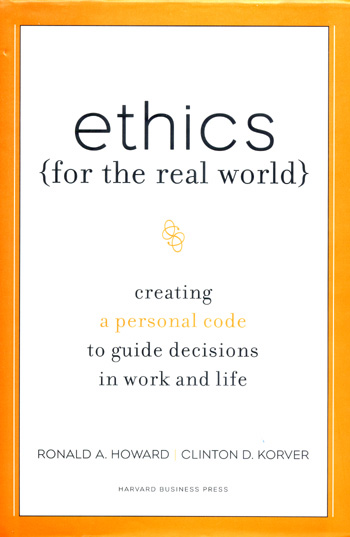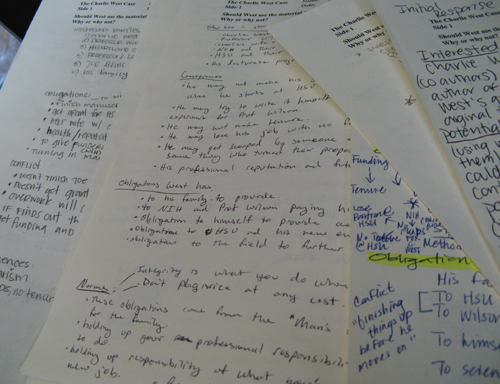
Ronald A. Howard and Clinton D. Korver (with Bill Birchard), Ethics for the Real World: Creating a Personal Code to Guide Decisions in Work and Life. Harvard Business Press, 2008.
I fully embrace the idea that ethics should not just be a subject of esoteric inquiry in philosophy departments but rather a central feature of our lives as we live them.
Yet how exactly that’s supposed to happen in a world where lots of people have been able to avoid ethics classes altogether presents a bit of a puzzle. Sure, we are presented with lessons about ethics outside the classroom, by family, friends, novelists and news commentators. But does a pile of maxims and sound-bites give us a coherent sense of ethics? Does it give us enough internal guidance to live lives we can be happy about?
Category Archives: Ethics 101
Considering an ethicist’s ‘questionable behavior’.
The press covering the story of bioethicist Glenn McGee’s departure from the post of director of the Alden March Bioethics Institute at Albany Medical College is hungry for an ironic twist. For example, Scientific American titles its article “An Unethical Ethicist?” What more fitting fall than some self-appointed morality cop going down on account of his own immoral dealings?
Believe me, I’m familiar with the suspicions people seem to harbor that ethicists are, in fact, twice as naughty as other folks. But from the evidence laboriously assembled in the SciAm article, I’m just not buying the picture of McGee laughing maniacally while twirling his mustache and plotting all manner of evil. (To be fair, despite the headline, I don’t think the SciAm piece is arguing that McGee is a villain, either.) Rather, I’m inclined to think that he made a few bad calls, but that the most likely explanation for his departure is good old fashioned academic politics.
Connections.
Because it strikes me as somehow related to my last post, and because Memorial Day is the Monday after next, I’m recycling a post I wrote last year for WAAGNFNP:
On Memorial Day, because I really needed to do something beside grade papers for awhile, I decided to go to the nursery to buy some plants. First, though, because the kids (who had the day off from school) were actually entertaining themselves pretty well, I poured myself another coffee and decided to actually read some of the articles in The Nation issue on climate change.
Ethical considerations in encouraging conservation.
After what has felt to me like a cooler than usual April and beginning of May, we seem finally to be changing seasons here. (OK, changing seasons with a vengeance — apparently our temperatures yesterday were record highs.)
Of course, in this part of California, we have two seasons: the green season and the gold season (which some insist on calling the brown season). The winter, and the winter rains, are over. Now it’s time for things to dry out.
This, as Michael O’Hare notes, means that water districts are trying to work out what to do about anticipated water shortages. He writes:
Passion quilt: a meme for teachers.
More than a month ago William the Coroner tagged me. It is not just that I am slow; this meme is challenging!
Not mush, methodology.

‘Stop snitching’ as part of the engineering student ethos.
Once again, I’m teaching the relatively new ethics module in “Introduction to Engineering”. Today was the discussion of what kinds of ethics might reasonably govern an engineering student’s behavior, and how these might be important on the road to becoming a competent grown-up engineer.
So of course, we talked about cheating.
A dialogue on pseudonymity, personae, and interpersonal relations in the blogosphere.
Janet D. Stemwedel: Hey, can we talk about pseudonymous blogging?
Dr. Free-Ride: Haven’t you already written a bunch of posts about that?
Janet D. Stemwedel: Yeah, but the blogosphere seems to be discussing it again.
Dr. Free-Ride: You know I only work on Fridays, right?
Janet D. Stemwedel: Get your pseudonymous butt in gear and help me have a proper dialogue!
A few observations on the difference between ethics and the law.
There is a rather vigorous exchange (although one that fails my test for a “dialogue” in a number of ways) going on in the comments on my post about Kay Weber’s efforts to keep going forward with her lawsuit against Fermilab. Since this particular ethics blog is my ethics blog, I’m taking this opportunity to butt in with some comments of my own.
Talking with kids about drugs.
Abel Pharmboy and Drugmonkey are having a conversation that I wish I could approach completely abstractly, about what parents ought to be telling their kids about drugs (whether legal or illegal) and their use. (Also, Page 3.14 has a reader’s poll about whether teens can be scared off illegal drugs. Poll results will be published in the ScienceBlogs Weekly Recap newsletter, for which you can sign up here.)
Of course, having two kids who are not yet teens but don’t seem to be getting any younger, the issue doesn’t feel abstract at all. The clock is ticking.
Here’s what is currently shaping my strategy:
Two scientists (‘we’re not ethicists’) step up to teach research ethics, and have fun doing it.
In the latest issue of The Scientist, there’s an article (free registration required) by C. Neal Stewart, Jr., and J. Lannett Edwards, two biologists at the University of Tennessee, about how they came to teach a graduate course on research ethics and what they learned from the experience:
Both of us, independently, have been “victims” of research misconduct – plagiarism as well as fabricated data. One day, while venting about these experiences, we agreed to co-teach a very practical graduate course on research ethics: “Research Ethics for the Life Sciences.” The hope was that we could ward off future problems for us, our profession, and, ultimately, society.
